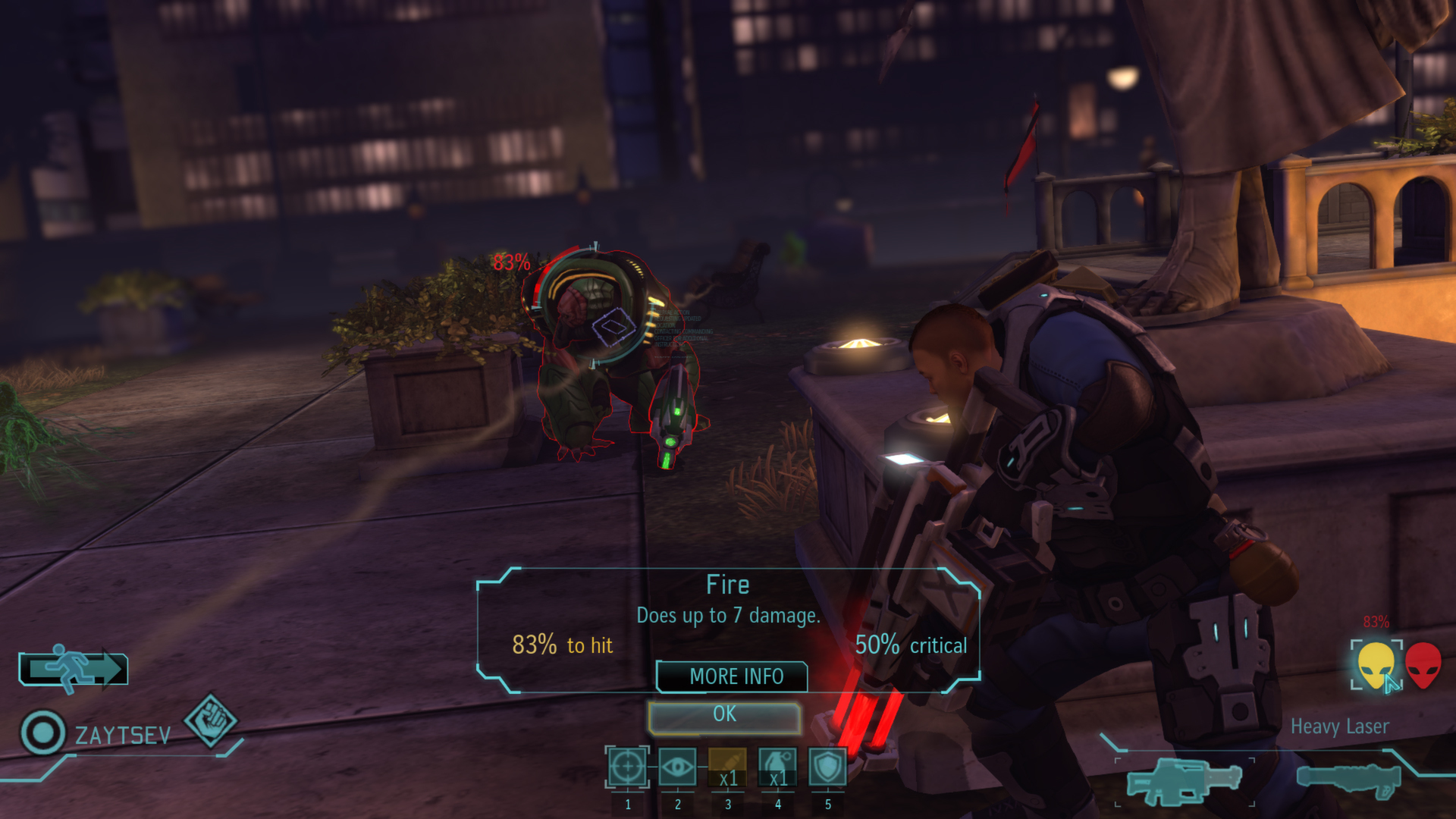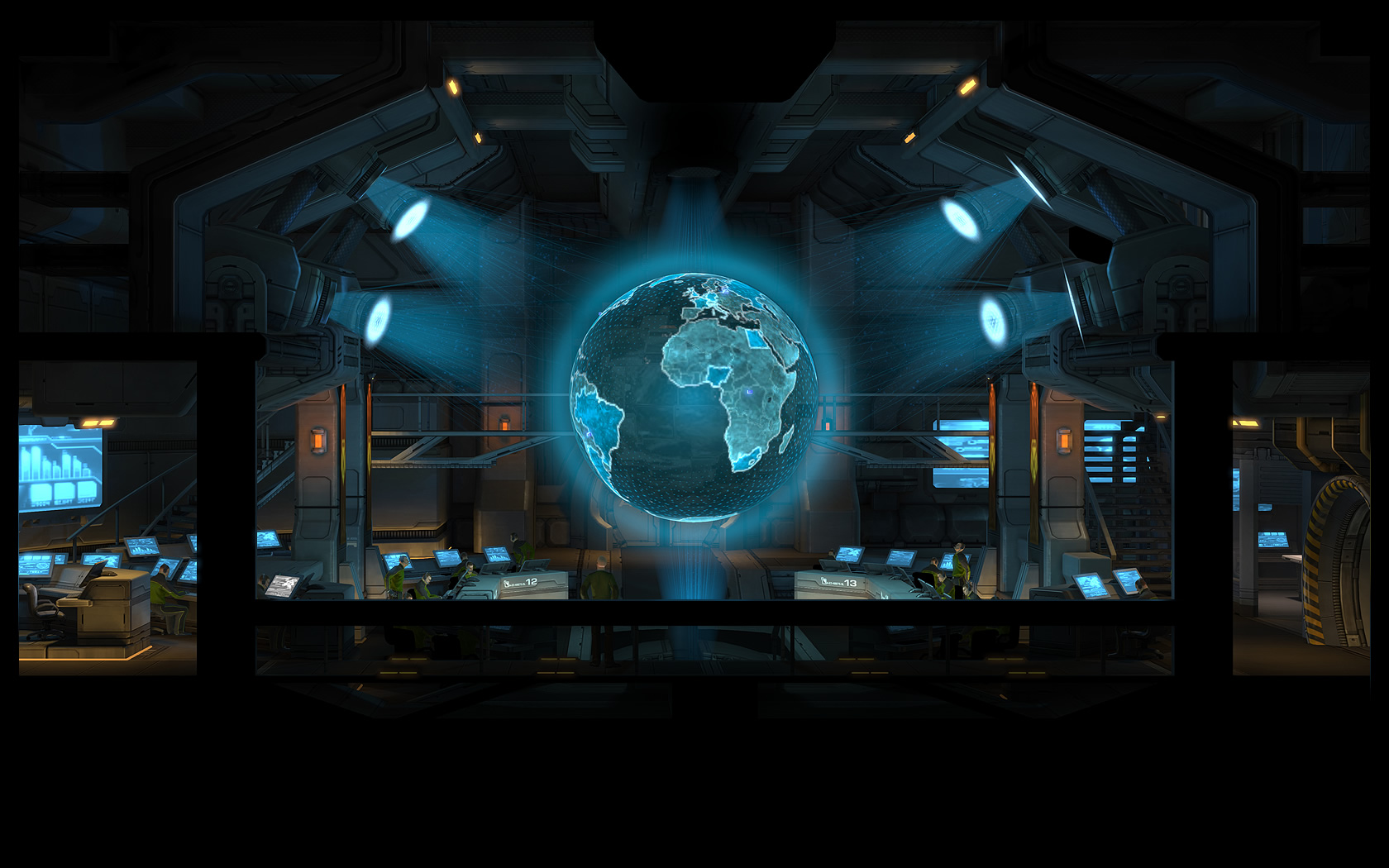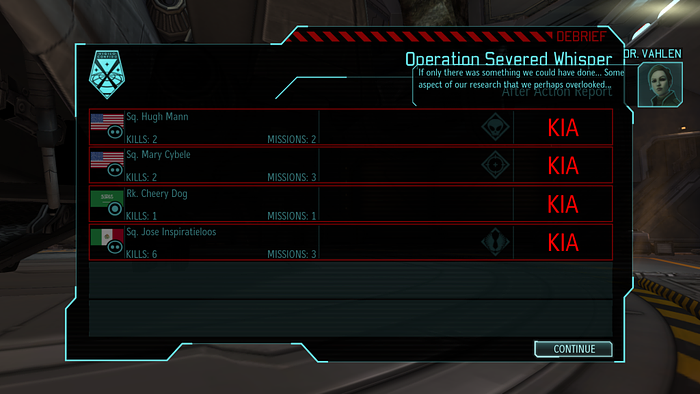
Featured Blog | This community-written post highlights the best of what the game industry has to offer. Read more like it on the Game Developer Blogs or learn how to Submit Your Own Blog Post
5 Things I Learned From XCOM
5 things I learned about game design after playing XCOM: Enemy Unknown.

I've been playing XCOM: Enemy Unknown, and came up with a list of five lessons in game design I derived from my experience.

1. You can never overdo theme.

Seriously, pump so much theme into your game that it cracks and bleeds theme blood all over the player. One of the very first things I noticed when I started playing was that the XCOM ripped me out of my chair, pulled me into an immersive environment and never let go of me. The combat scenarios are ripe with the intensity and stress of battle. The fact that a (albeit virtual) soldier's life is in the hands of my tactical decision-making, coupled by the suspenseful slow-motion build up before a combatant pulls the trigger produces an unforgetable tension.

The XCOM command center is designed to give the player a sense of the scope of the mission: engineers and scientists scurry to work on their current projects, soldiers in the barracks train and work out, and the interactive characters make eye-contact with the camera to engage the player, announce friendly reminders about the current state of the project, and allude to suggestions for future tactics and preparations.

On top of it all, Firaxis doesn't abandon their transition screens and UI design. Everything about the calm-before-the-storm battle preparation that many games tend to half-ass, XCOM nails down pat. The epic music that plays while I'm outfitting my squad, the awesome holographic image of the world under fire showing my dropship approaching the target location (a clever way to load a combat scenario), the cinematic of my squad busting out of the Skyranger and breaking for cover; not even for a second do I forget the gravity of my task. XCOM successfully evokes the thrill of being the XCOM Commander, but never lets me forget that the world is watching.
2. Balance is for squares.

I mean, life isn't fair right? So why should games be? No, I'm not saying that balance isn't something to pay attention to or work towards, but striving for perfect balance in every game under all conditions is both futile and unoriginal. Being behind or ahead of the balance curve or your opponents is a part of games. In the case of XCOM, dealing with the inadequacies of your strategy and the wildly fluxuating effect of randomness forces players to adapt their strategy to the state of the game.
For example, if UFOs have progressed beyond the capabilities of your fighter jets, you are forced to either spend the resources you would otherwise spend keeping your troops safe on upgraded interceptors, or suffer the panic spread of abandoned UFO sightings. While I don't endorse the argument that interceptors are an engaging mechanic or that simple resource management is enough to keep a player thinking, the fact that XCOM intentionally allows the meta-progression to influence your combat advantage or disadvantage is a bold but respectable design choice by Firaxis. Imagine if in Super Mario World, your success in a resource-management metagame affected Mario's jump height. Sounds dumb, but in a complex turn-based strategy game, Firaxis found the right niche where this fluxuation mechanic fits.
3. The most interesting characters aren't the scripted ones.
In modern game development often one of the most taxing and risky processes is the writing and animation of dialogue by human characters. In the case of XCOM, a small group of NPCs are fully scripted and animated for each cutscene to both teach the player the mechanics and walk them through the story.

Without getting into the critical details of the writing and direction, these dialogue sequences feel forced, cliche, and shallow. These characters represent a sharp separation between gameplay and story and break down the pace of play as a result. The result is a lack of human connection between the player and the game. Don't worry though, that role gets filled by these badasses:
![]()
In sharp contrast, the soldiers (the characters you actually control in combat) have absolutely no drive in the story, no pre-written character arc, and their dialogue is limited to a few sets of voice recordings for lines like "I'm out of ammo" and "enemy down". These characters are just the tabula rasa of the imagination. They are born with a random appearance, name, ethnicity, and nationality, and their story unfolds before you as you play the game. You remember them not because of their center-stage presence in the XCOM story, but because of the heroic things they do in battle; when your sniper racks up over a 100 kills across every mission, when your star soldier gives his life to complete the last mission, when your medic makes a miracle dash to save a dying comrade. These are the interesting characters in XCOM; not the scripted ones. It makes you wonder whether all the work that went into writing, recording, and animating the cutscenes that feature NPCs was even worth the effort.
4. Use secondary mechanics to continuously challenge the player.

XCOM's beautiful primary mechanic is shooting. Everything decision you make in XCOM is bent around how it improves your soldier's ability to shoot accurately, mitigates the enemy's ability to shoot accurately, or serves as utility to provide outlets for your soldiers to take greater risks in offensive or defensive plays.
For the sake of discussion, let's pretend that we are Firaxis sitting around a table with only the primary mechanics of XCOM established. We can move and shoot using our soldiers, and we have some ideas for basic utilities such as grenades and medikits. How do we make the enemies challenging? Well, the easy answer is simple: make them more accurate as the campaign progresses. This way, as the campaign moves forward, the aliens the player fights become more powerful, and the player is forced to purchase more accurate weapons to kill them off faster and purchase better armor to protect against more frequent injuries. But, Firaxis is composed of a group of game designers who actually know how to make games, so they didn't take the easy way out. Instead, strong game design utilizes secondary mechanics to introduce challenges to the player.

Secondary mechanics can be utilized on a global scale, by the AI, or by the player. In XCOM, the global-scale secondary mechanic is the progressive campaign. The aliens' power increases a time progresses, while the player is forced toan example of an enemy that uses secondary mechanics is the first enemy type the player encounters, the Sectoid. The Sectoid, like all soldiers, can aim and shoot, but they can also Mind Merge, and empower and ally. While Mind Merging an ally, if the source Sectoid is killed, so is the empowered ally. Immediately, the player not only moves and shoots, but is also challenged to defend their squad against the empowered Sectoid while hunting the Mind Merge source. Instead of numerically improving enemies to increase challange, Firaxis includes conditional powers that simultaneously endanger players and provide outlets for counterplay.
5. Ironman mode should be a convention.

In a game that revolves around taking risks, dipping your feet into dangerous situations, and carefully making consequential decisions, anything can be accomplished if a player can retry and retry and retry, testing every possible decision to find the optimal strategy and gaming the system of random rolls to produce a desired outcome. The save-load cycle isn't a bad thing - in a railroaded campaign, the player shouldn't have to replay the entire game from the beginning whenever they fail, it's just frustrating and time-consuming. But in a game that's designed as a complex web of situations navigated by series of player decisions and random number rolls, allowing the player to reload their game at a precise point absolutely strangles some aspects of the game and immersion.

Before college, I was really into the BioWare RPGs, which are classic example of games that can be ruined by abusing the save-load mechanic. BioWare's objective in creating their RPGs is to allow each player to immerse themself in the world and experience and grow from the decisions they make, whether they are beneficial decisions that shape the story in a positive way, or consequential decisions that end up punishing the player in some way. These aspects bleed into the game mechanics; if I get robbed by highwaymen, not only do I experience the act of being robbed, I also lose some of my items and currency. If I can save and load before crucial moments, then I can load the game over and over again trying every conversational option and battling enemies until every attack roll is a critical strike. This abuse breaks immersion because it shields me from exposure to failure, which is a part of the experience.
XCOM is the same way; if I can try a battle over and over again until all my shots hit and all my soldiers survive, then the game doesn't take skill anymore, it just takes time. Ironman mode is a game option available at the start of a campaign that allows the game to take control of your save files. Ironman games are autosaved in a single, constantly overwritten file, and thus the player cannot return to past moments to reevaluate their strategy. This mode forces the player to play the game start to finish, experiencing all the emotional victories and defeats along the way. Personally, I hope that every single-player campaign game in the future implements a mechanic like this, because it enforces challenge in games where dealing with failure is a vital mechanic throughout play.
In conclusion...
Everyone should play XCOM, it's an extremely cohesive game that demonstrates excellence in game design and balance. As for me, I wrote this blog over the course of a few months, so apologies if it seems disjointed. Share your thoughts with me, and thanks for reading!
Read more about:
Featured BlogsAbout the Author(s)
You May Also Like







.jpeg?width=700&auto=webp&quality=80&disable=upscale)








